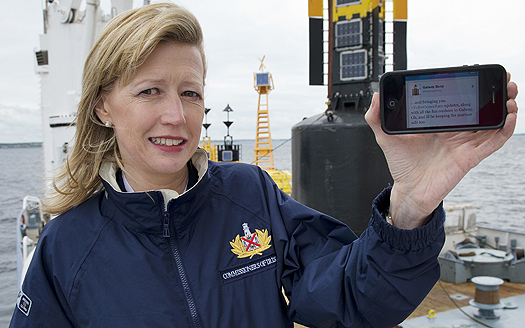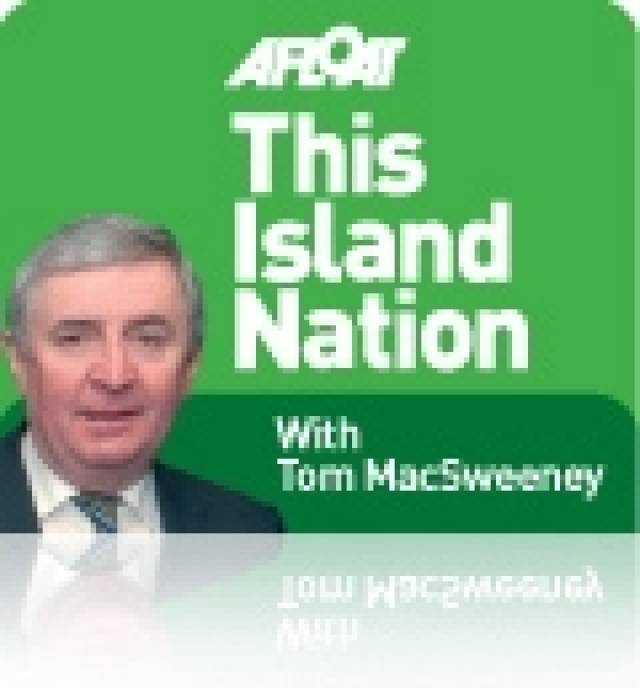In this week's column: Safety in sailing; ocean wealth in Galway; the US Navy going green; increased shipping in the Arctic Circle; Denis Noonan and the Round Ireland Race; Australia's world ocean reserve and the UK Coastguard suggests offshore sailors use satellite phones.
OCEAN WEALTH IN GALWAY
Rain was lashing against the bridge windows of the Irish Lights' vessel Granuaile in Galway Docks, the wind was howling. Most definitely, it was not a nice day to be on the water when I told the audience listening to me that we Irish people are fortunate to live on an island. I was launching the Ocean Wealth Showcase with Yvonne Shields, Chief Executive of the Commissioners of Irish Lights. It will take place at the Volvo Ocean Race Festival from June 30 to July 8 and will be well worth a visit.

Yvonne Shileds with the new Twitter buoy off Galway yesterday
Driving into Galway you can see that the city has embraced the Volvo Race and, talking to that great member of Galway Bay Sailing Club and one of the men whose determination brought the race to the City of the Tribes, John Killeen, we agreed that the overall result will be decided in the city. Eamonn Conneely, who sailed Patches to international success and Enda O'Coineen, were the other members of the trio which led the Galway Volvo campaign. Well done to them and all those involved, including hundreds of volunteers, who have established Galway on the world maritime map.
State agencies and commercial companies and organisations have put together the Ocean Wealth Showcase. Throughout the week there will be a wide range of exhibits demonstrating the scale and diversity of Ireland's ocean resources and their economic, social and environmental value to our island nation. In addition there will be a range of business and family events throughout the week.
It was a pleasure to launch the Showcase and to see how much commitment is being given to it.
The launch coincided with the placing of the Galway 'Twitter' Buoy in the Bay which will Tweet information about the Showcase as well as navigation and metocean information about the Volvo Race and Galway Bay. Look it up on www.twitter.com/GalwayBuoy.
TO SAIL OR NOT TO SAIL
There has been a lot of heavy weather around to test the ability of sailors. Not surprisingly, the issue of how safe is the sport and in what state of bad weather racing should be held, has arisen. I did not finish the first race of the Union Chandlery evening league at the RCYC in Crosshaven due to prevailing heavy weather conditions. The forecast was not encouraging but it seemed a reasonable assumption that the race could be held before a strong front arrived. Shortly after it began, though, the very heavy weather arrived. Wind strength was 27 knots, with gusts of 34 according to meteorological reports recorded at Roche's Point. With a reef in the main, two rolls of the headsail taken in on the furling jib, the boat still taking a pounding while reaching speeds of 8 to 9 knots at times, I decided it was better and safer for my 33ft. Sigma and crew not to continue to race and withdrew. In Class 3 in which I was competing, six of the seven boats taking part retired. Class 1 and 2 boats raced on to their finish.
Afterwards there was quite a bit of discussion about the conditions. Views ranged from those who thought them too heavy, to others exhilarated by what they had encountered, underlining that individual views differ about conditions. For those who ask when racing should or should not be held, the decision on whether or not to race and responsibility for it must be taken by the Skipper. Clubs will provide racing, but do state in their regulations that the decision to sail is that of the Skipper. Therefore the crew who go with him or her are presumed to support that decision. Insurance companies are careful about stating their position, but my understanding is that they regard the responsible person as the one who has insured the boat.
Experience of heavy weather is necessary for sailors because weather patterns can change quickly in these waters. Leisure sailing, to which I am referring in this regard, is different to professional racing such as the Volvo Round the World Race where conditions far different to club racing are experienced and sailors must be capable of dealing with them.
The second race of the league was cancelled this week because of the very heavy weather conditions, quite rightly in my view. I would be interested to hear views from readers.
NICE DOCKS IN GALWAY
I like the comment which Galway Harbour Master Capt.Brian Sheridan made to me about the new view the people of Galway have of the city docks:
"The people of Galway no longer refer to the 'docks' as a dirty, disliked place. It is now 'the harbour,' a positive part of the life of the city and it will be even more important, because the West of Ireland deserves to have a strong, vibrant port as a major economic contributor to the city and the western region."
He is one of the driving forces in the successful staging of the race. It is on his shoulders that arrangements for the berthing of the race fleet and visitors falls.
DENNIS NOONAN, WICKLOW AND THE ROUND IRELAND
"There were those who thought we wouldn't make it, but again we have," Dennis Noonan told me from Wicklow Sailing Club in that quiet but determined voice of his when we talked about this year's Round Ireland Race which will start on Sunday, June 24 and for which there are 38 entries as I write. The number includes more British than Irish. There are 18 from the UK, just 12 from Ireland, with several other countries represented. Dennis is a legend who has devoted huge energy to the staging of the Round Ireland. 'Fair Sailing' to all competitors.
I hear indications that Green Dragon, Ireland's former Volvo entry may be returning to racing and participate, with plans to use it for offshore training.
US NAVY GOING GREEN
The United States Navy is making a move towards going 'green'. In exercises off the coast of Hawaii next month five warships are to make Stateside maritime history when they become the first to use biofuels to power their turbines, as well as jets flying off a carrier's deck and helicopters hovering overhead. The flotilla will be powered by a mixture of cooking grease and algae oil of which 3,400 tonnes was loaded aboard the Naval fleet oiler, Henry J.Kaiser, this week to supply the ships. This is part of the U.S. Navy's efforts to move away from dependence on petroleum.
AUSTRALIA HAS WORLD'S LARGEST MARINE RESERVE
Australia has created the world's largest network of marine reserves where it will restrict fishing as well as oil and gas exploration to safeguard the environment and access to food the government says. The area covers 1.2 million square miles of ocean, a third of the island continent's territorial waters, which sustain more than 4,000 species of fish.
The environmental group WWF has welcomed the development but the government's conservative opposition has vowed to review the boundaries if it gets into power at elections next year, an outcome that opinion polls indicate is likely!
"I am instinctively against anything that damages the rights of recreational fishing and anything that will further damage the commercial fishing industry and tourism," opposition leader Tony Abbott said. {youtube}KPLvgZa3ltA{/youtube}
MORE SHIPPING USE OF THE ARCTIC
Shipping cargoes moving through Arctic waters are set to rise to their highest this year as companies use the route to cut journey times and fuel usage compared with Suez Canal shipments.
Nordic Bulk Carriers A/S plans to transport about six to eight 70,000 metric-ton shipments of iron ore to China from the Russian port of Murmansk starting next month. Using the Northern Sea Route for the journey instead of the canal is saving the company 1,000 tons of fuel, or $650,000 per journey.
SATELLITE PHONES OFFSHORE
It was interesting to see what appears to be a change of approach by the UK Coastguard this week when it suggested that offshore sailors should carry a satellite phone for emergencies,
Following the helicopter rescue of a solo sailor whose 22ft boat had been knocked flat repeatedly in Force 9 conditions, Falmouth coastguard issued a statement: "For offshore voyages leisure sailors are recommended to carry a satellite form of communication."
"It makes life easier for us if we can be in direct touch, because then we can establish what the problem is," said James Instance, Watch Manager at MRCC Falmouth. "An EPIRB is fantastic, but although it indicates position it doesn't say what kind of distress it is."
To Email your comments to THIS ISLAND NATION: [email protected]
Follow Tom MacSweeney on Twitter @TomMacSweeney and on Facebook































































